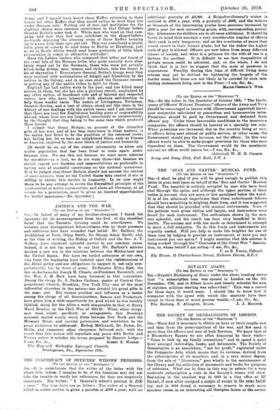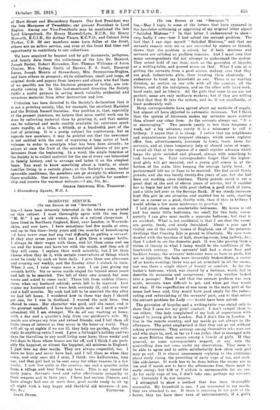THE SOCIETY OF GENEALOGISTS OF LONDON.
[To THE EDITOR OF THE " SPECTATOR."] SIR,—Many find it necessary to obtain an hour or two's respite now and then from the preoccupations of the war, and few need it more than the officers and men of both Services. We know that at 5 Bloomsbury Square we are often hOnoured by their visits- " Come to look up my family connexions," and to spend a quiet hour amongst index-slips, books, and documents. The Society of Genealogists is an association, "not for profit," registered under the Companies Acts, which means that its revenue, derived from the subscriptions of its members, and, in a very minor degree, from the sale of " literature," goes wholly to the maintenance of the library and the collection of documents and books for purposes of reference. What can be done in this way in return for a very moderate subscription a visit to the Society's rooms will show. Beginning in the smallest way in 1910 in a tiny office at 227 Strand, it soon after occupied a couple of rooms in the same build- ing, and in 1914 found it necessary to remove to much more spacious rooms in an interesting old Georgian house at the-corner
of Hart Street and Bloomsbury Square. Our first President was the late Marquess of Tweeddale; our present President is Lord Raglan. Among our Vice-Presidents may be mentioned the late Lord Llangattock, Sir Henry Maxwell-Lyte, K.C.B., Sir Henry Howorth, K.C.I.E., Sir Arthur Vicars, K.C.V.O., and Colonel John Parker, C.B. W our members some have fallen at the front, others are on active service, and even at the front find time and opportunity to contribute to onr collections.
We have acquired by bequest and by gift documents, pedigrees, and family data from the collections of the late Dr. Howard, Joseph Foster, Robert Hovenden, Rev. Thomas Williams of Aston Clinton, Mrs. Sydney Smith of Barnes, F. S. Snell, Peroeval Lucas, Joseph Morris of Shrewsbury, Mrs. Swynnerton-Hughes, and have others in prospect; while collections, small and large, of original deeds and papers from lawyers and others, who find them of no possible use for the business purposes of to-day, are con- stantly coming in. In this last-mentioned direction the Society fulfils a useful purpose in saving much valuable evidential and veracious material from utter destruction and loss.
Criticism has been directed to the Society's declaration that it is not a printing society, like, for example, the excellent Harleian and the British Record Societies. Our position is, that, especially at the present juncture, we believe that more useful work can be done by collecting material than by printing it, and that matter can be collected and made readily available for reference much more rapidly, at a tithe, a fiftieth, or a hundredth part of the cost of printing. It is a pretty subject for controversy, but as regards new members, it may be pointed out that the newcomer is not saddled with the cost of acquiring a long series of back volumes in order to ascertain what has been done already; he enjoys at once the fruit of the accumulated labours of his pre- decessors froni the beginning. In a word, the single function of the Society is to collect material for the use of every one interested in family history, and to arrange and index it on the simplest basis. You want to know something about a family, or about families living in a certain place; at the Society's rooms, under agreeable conditions, the members can go straight to whatever is there available. One word more. Ladies are eligible for member- ship and receive the warmest welcome.—I am, Sir, &c.,



































 Previous page
Previous page